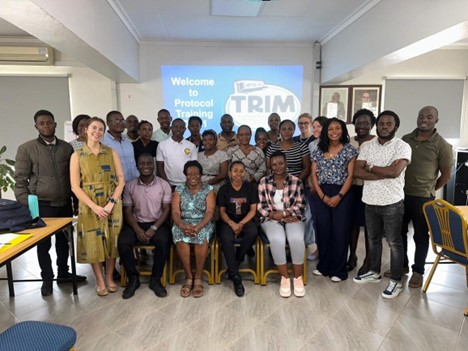Innovating HIV Prevention and Care: HPTN 111 (TRIM) Launches in Uganda Barbershops

HPTN 111 (TRIM), a vanguard study that brings HIV prevention services and education directly to barbershops in Uganda, has started enrolling participants. The pilot study aims to learn whether a barbershop-based HIV prevention initiative is feasible and acceptable to the barbers delivering the services and their clients. The TRIM study will enroll approximately 250 heterosexual men from 18 barbershops in the Kalangala Islands, Uganda. Twelve barbershops have been randomized to an intervention group and six to a control group. The participants recruited through barbershops in the intervention group will receive a barbershop-based HIV prevention initiative. In contrast, participants from the control barbershops will continue with the standard of care HIV services from the nearby health facilities.
The TRIM study answered the network’s call for creative ways to reach heterosexual men in areas with a high HIV burden. In East and Southern Africa, the HIV epidemic is primarily heterosexually transmitted, but men are missing from the HIV care cascade. Men and boys are less likely to test for HIV, initiate antiretroviral therapy (ART), and remain engaged in care; therefore, they are disproportionally more likely to die from AIDS-related illnesses and transmit the infection compared to their female counterparts.
“We need to think differently about how to support men in accessing health services. Men worry about missing work, the stigma associated with HIV, and going to health clinics that are usually stereotyped to favor women,” said Dr. Zubair Lukyamuzi, the HPTN 111 Protocol Chair, “we can leverage the existing relationship between a barber and his client. We think this will help men to feel comfortable learning about and accessing HIV prevention services while receiving haircut services.”
All participating barbers have been trained on the TRIM study, how to recruit their clients, and how to strengthen their interpersonal communication skills. Barbers who will deliver the intervention have received additional training to deliver the barbershop-based HIV prevention initiative, including providing status-neutral HIV education, HIV self-test kits distribution, provision of prevention and treatment referrals, and leading group sessions on HIV prevention with their clients. Clients enrolled in intervention shops will receive the HIV prevention initiative from their respective barbers during their regular haircuts. All enrolled participants will have study-specific visits for up to 12 months.
The Division of AIDS (DAIDS), the National Institute of Allergy and Infectious Diseases (NIAID), and the National Institutes of Health (NIH) provide support for HPTN 111 (TRIM).
For more information about HPTN 111 (TRIM), visit www.hptn.org/research/studies/215 or ClinicalTrials.gov using the study identifier NCT06148584.